What is Arrow's impossibility theorem, which states that it is impossible to design an electoral system that always satisfies multiple standards of fairness simultaneously?

In 1951, Nobel Prize winner in economics
Arrow's Impossibility Theorem | Infinite Series - YouTube
Different voting systems can dramatically change the outcome of an election, and any voting system used must fairly represent the opinions of voters.
The PBS Infinite Series lists two general characteristics that a voting system should have: The first is 'unanimity.'

This property, also known as

The second is 'independence from irrelevant options.'

This means that even if an unforeseen event occurs, such as orange dropping out of the election after the vote, the relative rankings of the other colors will not be reversed.

A voting system that meets all these characteristics at the same time is called a ' dictatorship .' In a dictatorship, the election outcome is determined by the vote of a single individual, the dictator, which eliminates the need to count everyone's votes equally or to exclude some votes from being counted.

However, dictatorships have drawbacks, such as significantly restricting individual freedom, and few countries today have dictatorships. On the other hand, according to Arrow, there is no ranked voting system that satisfies all of the following requirements: unanimity, independence from irrelevant options, and non-dictatorship. This is Arrow's Impossibility Theorem.

To prove Arrow's impossibility theorem, the PBS Infinite Series conducted an experiment in which they introduced 'extreme candidates' who were always voted either top or bottom.
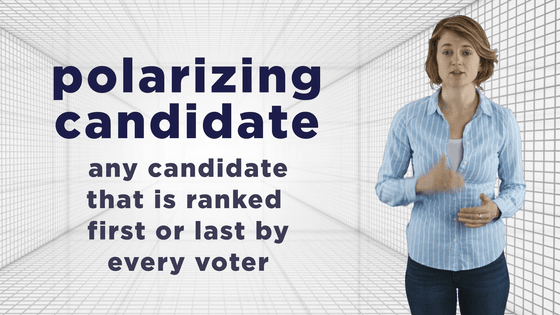
In the experiment, five voters ranked the four colors green, blue, purple, and red. The rule was that each voter must vote for purple as either 1st or 4th. Voting took place in six rounds, and each round one voter was required to change their vote for purple from last to first.
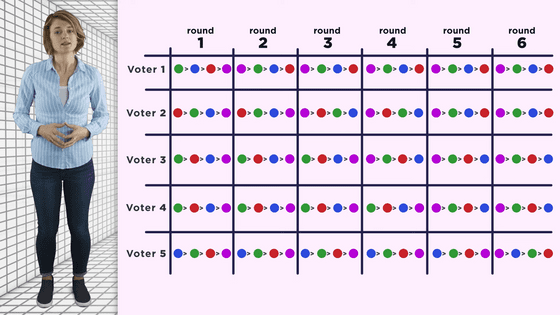
As a result of the voting, purple was ranked last overall in the first two rounds, but from the third round onwards, purple rose to the top.
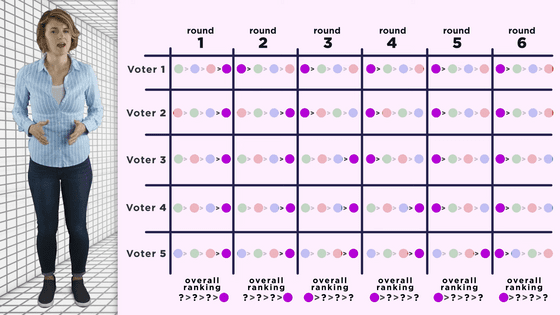
If we look at the difference between the second and third rounds, we can see that voter 2 ranked purple fourth in the second round, but ranked it first in the third round. Therefore, voter 2 corresponds to the dictator in this experiment. In this case, voter 2's vote will be weighted regardless of how other voters submit their ballots.
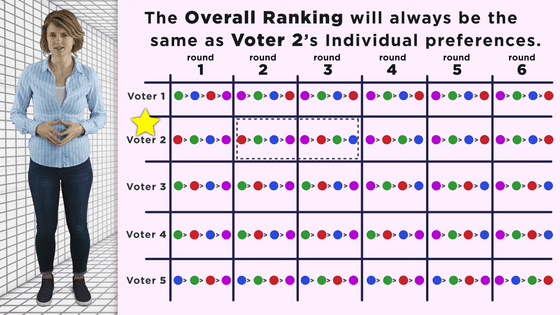
Next, PBS Infinite Series conducted an experiment using the following election results to prove that 'the overall ranking is the same as the voting result of voter 2', that is, that voter 2 is a dictator.
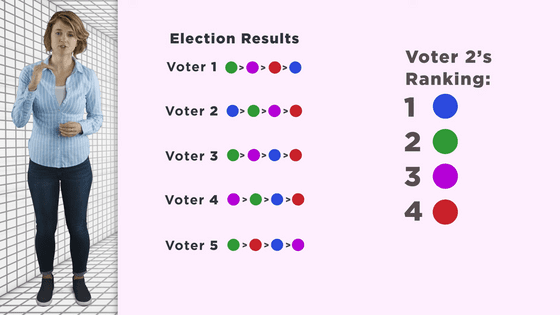
First, to make it easier to compare the votes from the second and third rounds, we make the following modifications to each voting result: 1st place voter 1 will be purple; 2nd place voter 2's green and purple will be swapped; 3rd place voter 3, 4, and 5's fourth place will be purple.
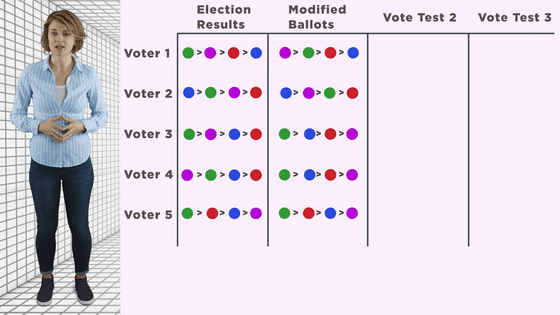
Looking at the results of the second round (Vote Test 2) in the first experiment, blue was ranked higher than purple in the overall ranking, i.e., 'blue] purple.'
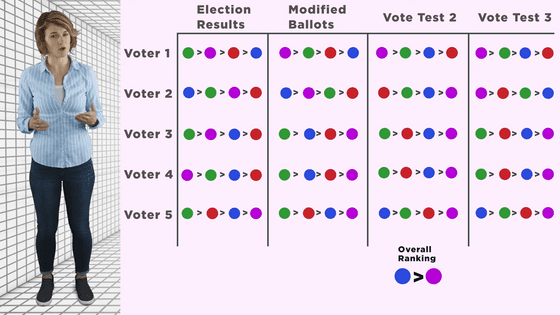
And the modified ballots are also blue/green.
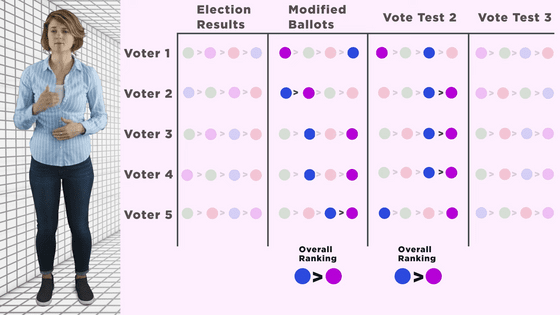
If we compare the revised voting results with the third round (Vote Test 3) of the first experiment, we can see that both are 'purple/green.'
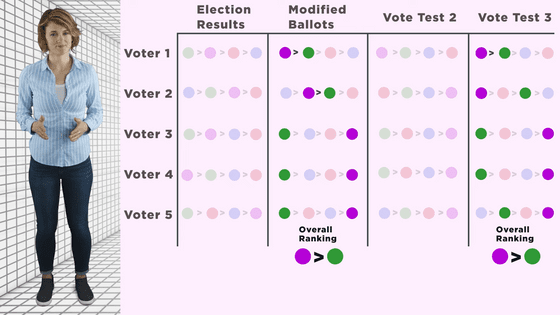
The result of the corrections is summed up as 'blue]purple and purple]green'. Therefore, we can say 'blue]green'.
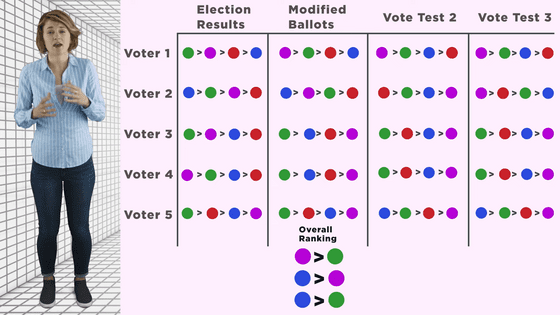
And when comparing the actual voting results with the revised voting results, the only one who satisfies [blue]green is voter 2.
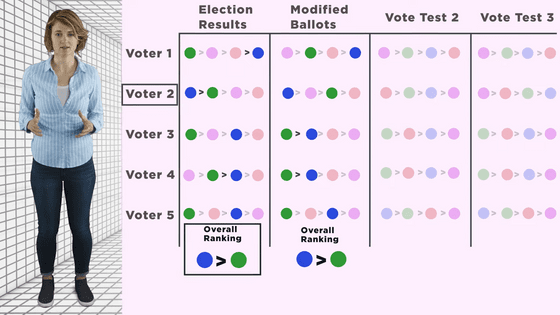
In other words, this vote proves that it reflected the opinion of Voter 2, the dictator, regardless of the opinions of other voters.
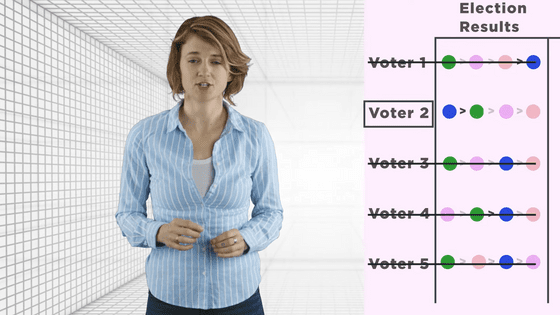
'Most systems have the potential to go wrong sometimes,' Arrow said of his Impossibility Theorem.

Related Posts:







